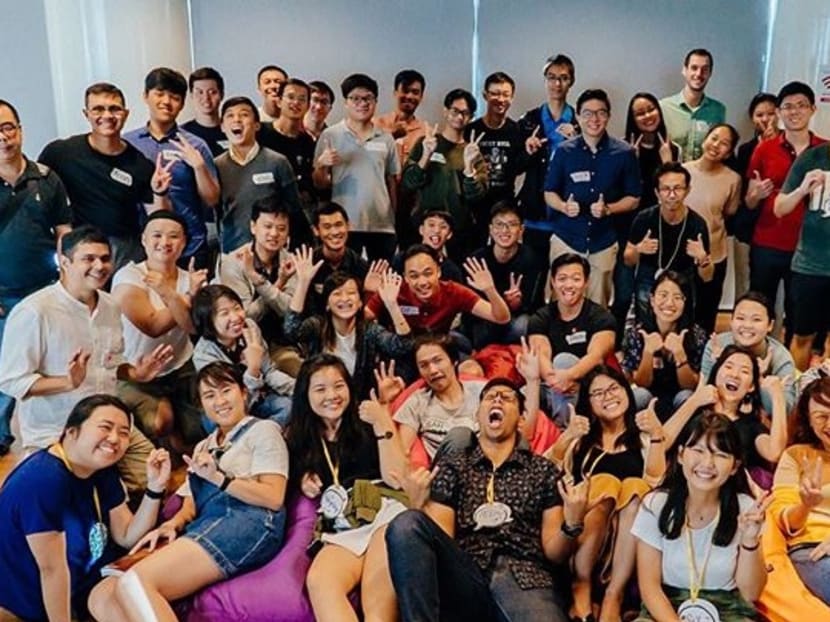How Singapore’s youth are changing the social sector by going beyond volunteerism
OpenJio is a network of young change-makers and social sector professionals from a wide range of community backgrounds. Many of them have developed a keen awareness that building a better society would require not only stepping forward to plug gaps in the social sector, but also stepping up to drive or demand more extensive change over the longer term.
The room was already buzzing when I arrived, with groups of participants exchanging their latest ideas.
As I sat down, I found myself in the company of a design researcher hoping to transform social service delivery, a social entrepreneur working to provide those entering the workforce with training in soft skills, and a university student who had formed a reading group to discuss books on Singapore society, starting with Teo You Yenn’s This Is What Inequality Looks Like.
These individuals — all in their early 20s — had come together through OpenJio, a network of young change-makers and social sector professionals from a wide range of community backgrounds.
Launched last year by a team of undergraduates in sociology and social work, OpenJio now runs a Telegram channel (with more than 1,800 subscribers) that shares ground-up initiatives in areas as diverse as climate change activism, mental health support, and migrants’ rights.
At “OpenJio Opens Up”, the first such community gathering hosted by the group’s founders, I was thrilled to meet peers who were devoted to creating social change, some of whom had even staked their careers on doing so.
What struck me most was how many of them had gone beyond just volunteering: Starting non-profits to support underserved communities, advocacy groups to push for policy change, or public campaigns to shift the national conversation on issues they cared about.
In doing so, many had developed a keen awareness that building a better society would require not only stepping forward to plug gaps in the social sector, but also stepping up to drive or demand more extensive change over the longer term.
In Singapore, volunteering has become central to our civic narrative. It is an established part of our citizenship curriculum, where students are taught to make good on the privilege of education by giving back to the community.
Working adults are engaged by the Singapore Kindness Movement and the National Volunteer and Philanthropy Centre, while even retirees are encouraged to volunteer as Silver Generation Ambassadors or through organisations such as RSVP Singapore.
As a result, many young Singaporeans have gained meaningful, even transformative, experiences of direct community service from their years in school.
I, too, have my stories to share, from helping at a day rehabilitation centre for the elderly, to teaching classes at the Children’s Cancer Foundation.
But it is only later that many of us ask deeper questions about whether volunteering can effect systemic change, and why some roles in the social sector require volunteers to fill them in the first place.
While studying overseas, I joined a broad-based campaign formed by different non-profits to address the issue of homelessness in our city.
While organising assistance for the homeless community during the winter months, we also started platforms where community representatives could share their views, and petitioned the city council on their behalf to improve the provision of subsidised shelters.
Some of these initiatives succeeded; others didn’t. What was important was that direct service was accompanied by efforts to diagnose, and address, deeper structural issues.
It was important to us that as many homeless persons as possible found shelter that winter, and equally important that we worked to change conditions in the city so that no one would have to spend a winter on the streets.
Returning home to Singapore, I began to see that the same questions could be asked here.
Undeniably, volunteering represents a critical infusion of time, money and skills into the social sector, all of which are precious resources for any community organisation.
For those who volunteer, it can also bring people together, widen perspectives, and yes, build a critical foundation for civic values.
But when it comes to providing critical social services or fixing systemic problems, volunteering cannot be a long-term solution. Volunteers lack the professional training to support those with specialised needs, and may be unable to make sustained and fruitful commitments.
Their unpaid labour, though willingly performed, conceals the true cost of providing professional and dedicated social services.
Realising this, young people who care deeply about social issues have begun independent efforts to understand their causes, raise public awareness and lobby for change.
Some, with the means and know-how, have started platforms to push for solutions themselves. To name one example, the Cassia Resettlement Team, which provides crucial support to residents relocated from Dakota Crescent, has also shone a spotlight on wider questions of income inequality and urban heritage.
Like them, the team at OpenJio have arrived at a similarly farsighted vision: To equip their peers with a deeper knowledge of social issues, and thus give them a better starting point to get involved.
Through these initiatives, they hope that many others will gain the crucial skills and perspectives to eventually drive social and structural change, individually and collaboratively.
The next time someone invites you to volunteer your time or skills in some way, do say yes.
Better still, why not take the chance to start a conversation about why this role or service remains lacking in our social sector, and what solutions — including shifts in government policy — might exist?
It all begins with the recognition that empty slots in a volunteering schedule might just point to something deeper, while true solutions, if we push for them, may be well within reach.
ABOUT THE AUTHOR:
Theophilus Kwek has been shortlisted twice for the Singapore Literature Prize. He works in the healthcare sector.










